My husband Ron George's book, Chief: The Quest For Justice in California, was released last month. Among the book cover reviews is the following description:
"Ronald George's life is an epic in modern American law. In the Supreme Court of the United States and that of California -- where he was a distinguished Chief Justice -- George touched and shaped all the great legal issues of his day. His remarkable oral history, which covers everything from the Hillside Strangler case to the battle over same-sex marriage, is a wonderful introduction to this remarkable man." --Jeffrey Toobin, Author of The Nine and The Oath.
The book is not confined to such heady stuff; some college capers from Ron's Princeton days are included as well. Hopefully this will be of interest to his classmates,
Barbara J. George -12/21/13
[Click here to find it on Amazon]
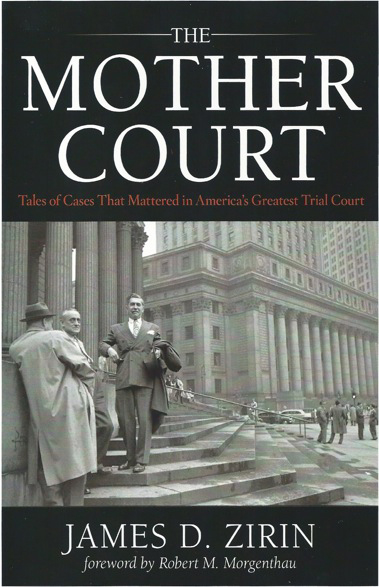 I am happy to share that my book, entitled "The Mother Court -- Tales of Cases that Mattered in America's Greatest Trial Court" will be published in hardcover later this year by an imprint of ABA Publishing. Bob Morgenthau has written a foreword for the book, and it has gotten better and better with each revision.
I am happy to share that my book, entitled "The Mother Court -- Tales of Cases that Mattered in America's Greatest Trial Court" will be published in hardcover later this year by an imprint of ABA Publishing. Bob Morgenthau has written a foreword for the book, and it has gotten better and better with each revision.
The entire project is so exciting. Great news for us.
Jim Zirin - 7/18/13
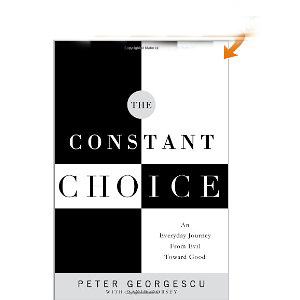 Peter Georgescu has announced that his latest book, The Constant Choice: An Everyday Journey From Evil Toward Good, will be published in January, 2013.
Peter Georgescu has announced that his latest book, The Constant Choice: An Everyday Journey From Evil Toward Good, will be published in January, 2013.
He notes, "I wrote the The Constant Choice realizing that we live in extremely challenging times. We seem headed toward less compassion and consideration, failing to overcome that basic instinct that often leads to evil in human behavior &ndash self-preservation and self-agrandisement at all costs. Yet, we can become better people and build a better world, by opting for good over evil one choice at a time." - 11/30/12
For more about his life and book, click here.
Class of 1961 History --- Physician-scientist book
Martha and I greatly enjoyed seeing you and Ellen at the Tailgate Saturday.
We had a splendid visit Thurs-Saturday. First there were events and discussions with the new Dean, Cecelia Rouse, at the WWS about SINSI---the Scholars in the Nation's Service Initiative—and dinner with Admiral Mullen and George Shultz '42, plus discussions about plans for the next Omenn Lecture in Science and Technology Policy. Then there were forums and a big dinner celebrating the success of the Aspire Campaign. And I visited three scientific colleagues on the PU faculty.
I mentioned the book of autobiographical vignettes by 20 Physician-Scientists: Medicine, Science, and Dreams, edited by David Schwartz. Please note Chapter 15 by Mike Iseman and Chapter 18 by me (especially p.273). Here is the draft version (before the figures and captions were matched!).
Best wishes,
 Dear Danny:
Dear Danny:
I finished reading your book [Democracy Despite Itself: Why a System That Shouldn't Work at All Works So Well by Mike Edwards and Danny Oppenheimer] which I downloaded on my Kindle during your talk at the PCNWNJ dinner on March 7th. I think that your book is terrific in that everything you wrote was so well laid out and simply stated that it’s hard to believe that it all was not common knowledge long ago. I now have the perspective to be concerned about elections without having to agonize over them. I would recommend it to all citizens from jr high school age and up. Your talk was great and your book even better. [click here for more information about the book.] Joe Prather - 3/11/12
 Jim Blair recently alerted me to classmate Frank Deford’s book, Bliss, Remembered. I just finished it and would recommend it to all our classmates. Frank has written a well-crafted and creative story about love, family and sports during and after the 1936 Olympics in Germany. It is available in hard cover, audio and on Kindle and Nook. A good read! - Dick Edmunds - 1/25/12
Jim Blair recently alerted me to classmate Frank Deford’s book, Bliss, Remembered. I just finished it and would recommend it to all our classmates. Frank has written a well-crafted and creative story about love, family and sports during and after the 1936 Olympics in Germany. It is available in hard cover, audio and on Kindle and Nook. A good read! - Dick Edmunds - 1/25/12
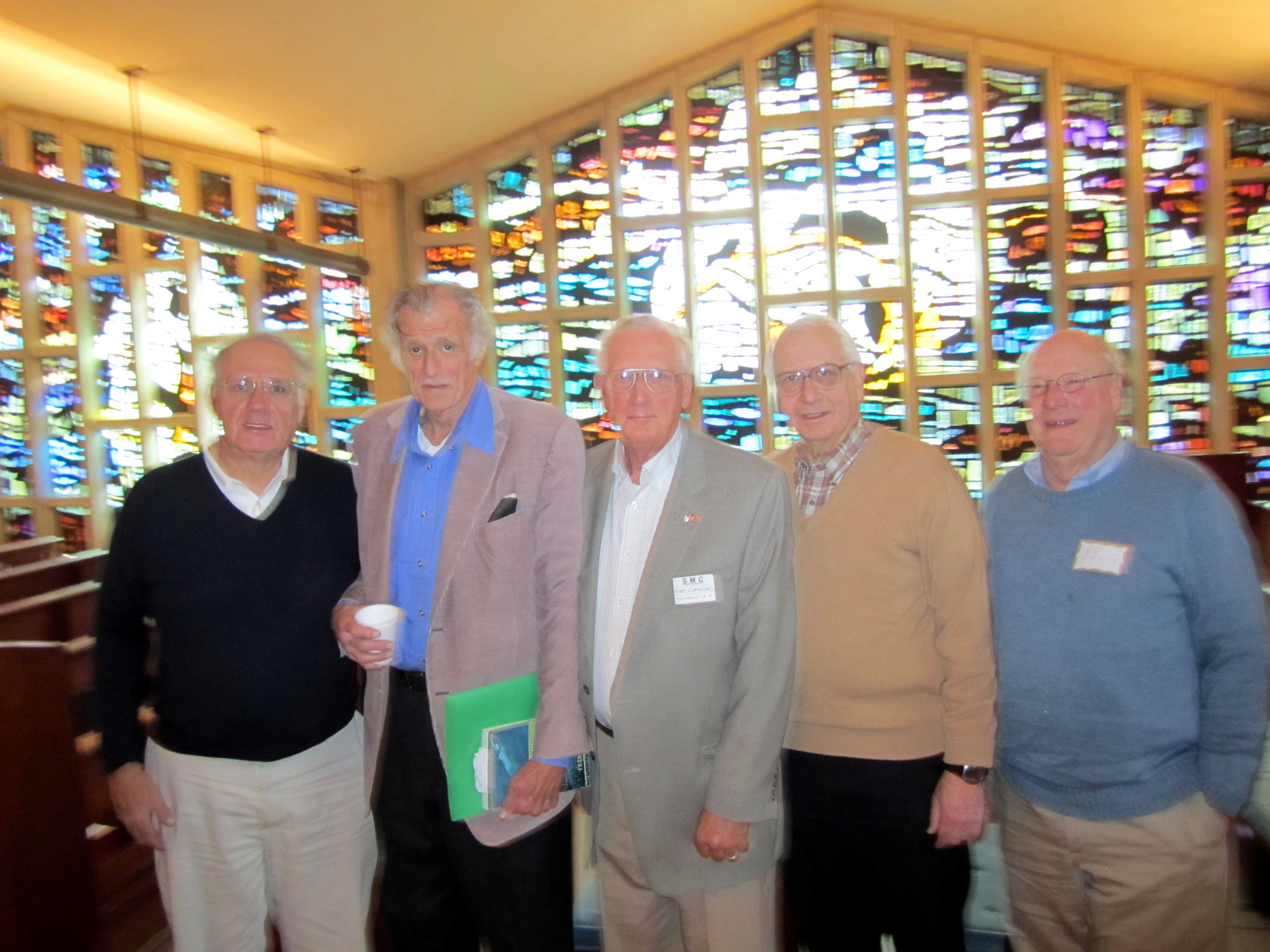 On April 15, 2011, five classmates (l. to r. Barry Schaefer, Frank Deford, George Brakeley, Len Berton, Ed Mulock) gathered at the New Canaan, CT senior men's club meeting in St. Mark's Church. Introduced to the members by George, Frank gave an entertaining presentation about his latest novel, Bliss Remembered. He explained how this is the first time he wrote "disguised as a woman" but since it's a love story, he didn't find it too difficult to get into the proper mindset. It features an Olympic-caliber swimmer who meets a young man at the 1936 Berlin Olympics and falls in love. His parents are Nazis but he is not really subscribed to Hitler's doctrines. In fact, the world at that time did not know whether Hitler was "just one more European dictator." The book is highly recommended, and as you will observe, Frank is holding the paperback version which is coming out shortly.
On April 15, 2011, five classmates (l. to r. Barry Schaefer, Frank Deford, George Brakeley, Len Berton, Ed Mulock) gathered at the New Canaan, CT senior men's club meeting in St. Mark's Church. Introduced to the members by George, Frank gave an entertaining presentation about his latest novel, Bliss Remembered. He explained how this is the first time he wrote "disguised as a woman" but since it's a love story, he didn't find it too difficult to get into the proper mindset. It features an Olympic-caliber swimmer who meets a young man at the 1936 Berlin Olympics and falls in love. His parents are Nazis but he is not really subscribed to Hitler's doctrines. In fact, the world at that time did not know whether Hitler was "just one more European dictator." The book is highly recommended, and as you will observe, Frank is holding the paperback version which is coming out shortly.

Comment by Ed Farkas on Jim Zirin's article of December 28th, 2011.
A short time ago we received Jim Zirin’s excellent article on prospects for 2012. No one can argue with Jim’s basic thesis: we face a severe lack of certainty and a severe lack of clarity.
Among many other issues, Jim asks "What is our strategy to reduce the deficit;…create jobs;…?” Here is my answer to this question:
In the early1960s we moved in an unprecedented new direction in that we voluntarily and of our own volition began to send our manufacturing to foreign countries.
50 years on in this new direction we have a clear signal that a national economy cannot survive without a very substantial level of manufacturing.
Why is manufacturing so important? What about important and respected employment as a teacher, bus driver, hotel chambermaid, or police officer? The difference is that manufacturing creates something new and lasting that was not there before. The manufacturing worker starts with components and raw materials and makes a finished item that the consumer wants to buy. The value of the inputs is less than the value of the finished item. The result is a value-added or wealth-creation effect that enriches the economy.
Send manufacturing employment out of the country and you lose the wealth-creation/enrichment effect. You are left with impoverishment.
Adam Smith’s 1776 book "Wealth of Nations” is probably overquoted. In any case, how much of a 236-year-old book is still applicable? But let’s discuss. One theory in the book is that if individual business firms act in their own self-interest, the overall result will be beneficial to the nation as a whole.
In the 1960s individual business firms who sent their manufacturing jobs to foreign countries benefitted from lower manufacturing costs while still selling at the same prices into a largely prosperous economy.
Today, business firms complain of slow sales in the U.S. Well, of course! A number of 25 million unemployed or under-employed is thrown around. Maybe it is a reasonable estimate. Clearly these people aren’t strong shoppers. Also, people who still have employment do not feel secure with the result that their shopping is also limited.
So we see that the unprecedented action of voluntarily sending manufacturing to foreign countries did not work out well for many individual business firms or for the nation as a whole.
The principle of absurdum ad infinitum could and should have been applied in the 1960s when the seeds of our present disastrous situation were being planted. This principle states that if a process is carried to its logical final end point, and the result is absurd, then the process is invalid. In our context here, if every manufacturing firm sends its jobs overseas, then there will be no one left in America who can buy the goods made overseas.
Still, we believe in free enterprise; individual business firms are free to act in what they see as their own interest, even if they are completely mistaken.
But governments should have acted to prevent or at least slow the sending of manufacturing jobs overseas. Governments should have seen disaster down the road if manufacturing was lost. If wages were too high in the 1960s, due to union action or other factors, governments should have involved themselves to solve the problem by negotiation, by changes in the tax system, or other means.
I believe that business and government "leaders” were not aware of the wealth-creation effect of manufacturing, and therefore were not aware of the economic damage associated with a substantial reduction in the size of the manufacturing sector in America.
Governments also did not seem to be aware that laid-off workers don’t pay taxes, and workers receiving less income pay less in the way of taxes. Even today there is very little understanding on the part of governments or politicians at any level that deficits are a result of people not having employment and therefore not paying taxes. All politicians want to do is cut, rather than doing anything to increase manufacturing employment.
Another impoverishing aspect of the situation is our trade deficit in manufactured goods with all foreign countries of over $500 billion per year. This amount is real wealth pouring out of our country, $1600 per year for every American man, woman, and child.
I say that loss of manufacturing employment is the cause of America’s economic problems, and therefore the only way to solve these problems is to cut imports and increase domestic manufacturing.
I have used a good many words in the above paragraphs.
Ed Schultz, host on MSNBC, has said the same thing, but has said it better, and has used many fewer words! To wit,
"We don’t have a tax problem, we have a revenue problem. We’ve told American workers they’re not valuable anymore, that it’s better to do it overseas than it is right here. That’s wrong. We need to reinvest in people, reinvest in manufacturing. That’s how we’re going to turn our economy around.” (The New Yorker, October 31, 2011, page 35.)
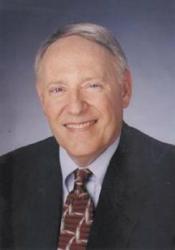 Leading Risk Management Analyst Dr. David Hulett to Publish Second Book
Leading Risk Management Analyst Dr. David Hulett to Publish Second Book
On May 25, 2011, Dr. David Hulett, an award winning author and publisher of Practical Schedule Risk Analysis announced the release of his second book, Integrated Cost-Schedule Risk Analysis. Click here for more information.


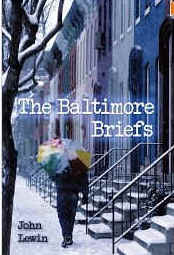 The Baltimore Briefs provides an insider's rare view of the Maryland legal system, its attorneys and those they defend. Unanticipated quirks, quibbles and peculiarities of human behavior occur in many courtrooms, often from the witness chair. This book, written by classmate John Lewin, presents those characters and the strange events drawn from a forty year legal career in Baltimore, the "city that bleeds". You will meet some good guys and some scoundrels and the ironies of their lives. From this work of non-fiction, you can expect a rocky but readable ride. One reviewer likened the book to a great toast, describing it as "Irresistible tales of people scrapping it out in the legal theater."
The Baltimore Briefs provides an insider's rare view of the Maryland legal system, its attorneys and those they defend. Unanticipated quirks, quibbles and peculiarities of human behavior occur in many courtrooms, often from the witness chair. This book, written by classmate John Lewin, presents those characters and the strange events drawn from a forty year legal career in Baltimore, the "city that bleeds". You will meet some good guys and some scoundrels and the ironies of their lives. From this work of non-fiction, you can expect a rocky but readable ride. One reviewer likened the book to a great toast, describing it as "Irresistible tales of people scrapping it out in the legal theater."



 Now retired, Robert G. Fuller, Jr, practiced law in Maine for over thirty-five years. He also served in the Judge Advocate General's Corps of the United States Navy. During his career, he developed extensive contacts among Maine trial lawyers, judges, law enforcement personnel, prosecutors and forensic analysts, all of which have contributed to the authentic flavor of this novel.
Now retired, Robert G. Fuller, Jr, practiced law in Maine for over thirty-five years. He also served in the Judge Advocate General's Corps of the United States Navy. During his career, he developed extensive contacts among Maine trial lawyers, judges, law enforcement personnel, prosecutors and forensic analysts, all of which have contributed to the authentic flavor of this novel. 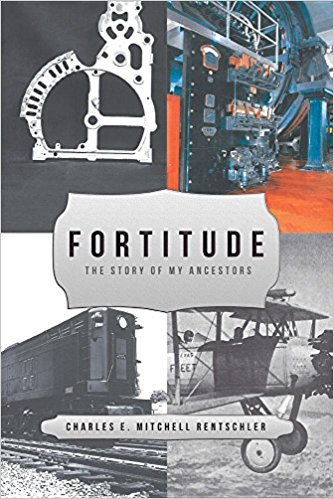 TO: George Brakeley
TO: George Brakeley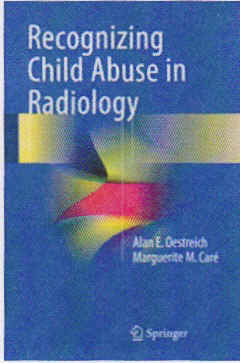 Recognizing Child Abuse in Radiology
Recognizing Child Abuse in Radiology M
M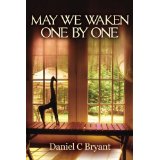 During her junior-year-abroad in Senegal, idealistic Beth Barton meets charismatic sculptor Malik Ndour and, without her parents’ knowledge, marries him. The couple’s arrival at her home near Portland, Maine, in early 2001, throws the parents’ marriage into turmoil, and soon puts stress on the newlyweds’ relationship as well. As a result of mounting domestic and racial tensions, the broader clash of African and Western cultures, and the attack of 9/11, Malik grows increasingly estranged and falls prey to a jihadist recruiter. Late one December night, on Portland’s freezing, fogbound docks, he sets out on his first deadly assignment. The ensuing crisis throws further light on the mindset of a terrorist, as well as on the diverse attitudes of his intimates toward him.
During her junior-year-abroad in Senegal, idealistic Beth Barton meets charismatic sculptor Malik Ndour and, without her parents’ knowledge, marries him. The couple’s arrival at her home near Portland, Maine, in early 2001, throws the parents’ marriage into turmoil, and soon puts stress on the newlyweds’ relationship as well. As a result of mounting domestic and racial tensions, the broader clash of African and Western cultures, and the attack of 9/11, Malik grows increasingly estranged and falls prey to a jihadist recruiter. Late one December night, on Portland’s freezing, fogbound docks, he sets out on his first deadly assignment. The ensuing crisis throws further light on the mindset of a terrorist, as well as on the diverse attitudes of his intimates toward him.
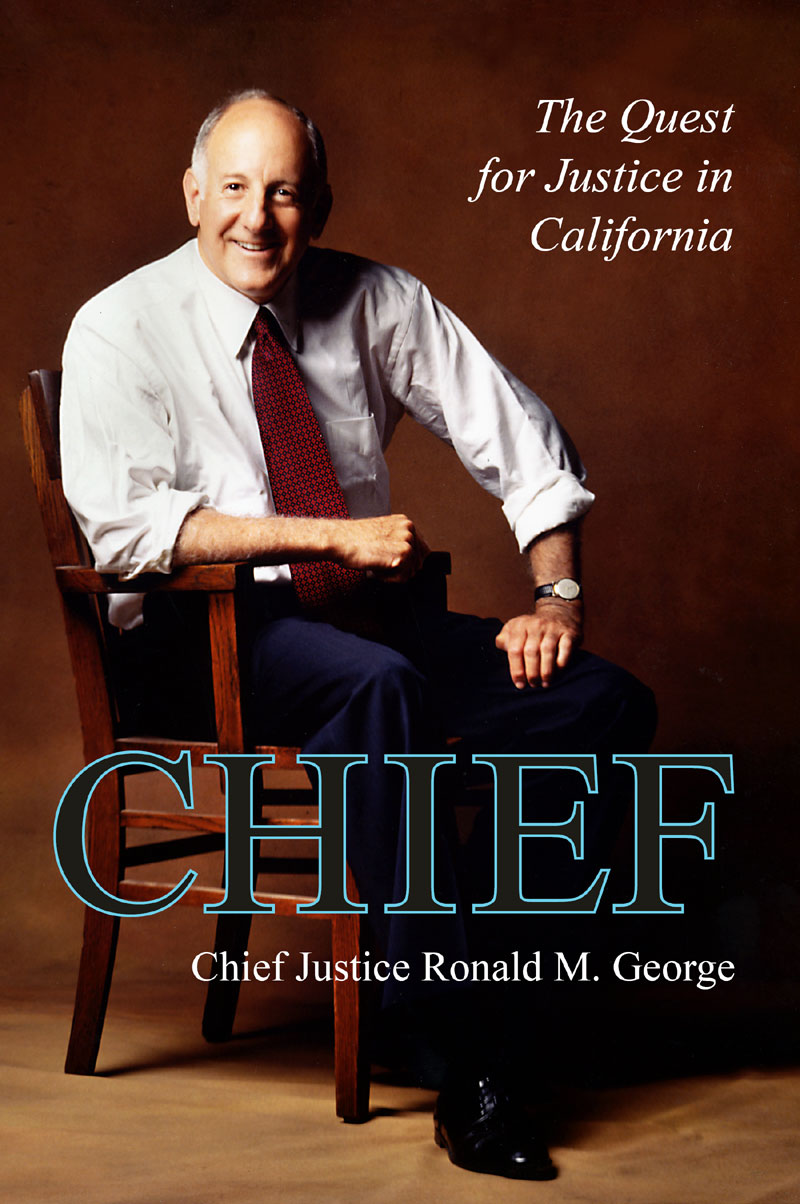
 I am happy to share that my book, entitled "The Mother Court -- Tales of Cases that Mattered in America's Greatest Trial Court" will be published in hardcover later this year by an imprint of ABA Publishing. Bob Morgenthau has written a foreword for the book, and it has gotten better and better with each revision.
I am happy to share that my book, entitled "The Mother Court -- Tales of Cases that Mattered in America's Greatest Trial Court" will be published in hardcover later this year by an imprint of ABA Publishing. Bob Morgenthau has written a foreword for the book, and it has gotten better and better with each revision.
 Dear Danny:
Dear Danny: Jim Blair
Jim Blair On April 15, 2011, five classmates (l. to r.
On April 15, 2011, five classmates (l. to r. 



 The
The